Giáo án Tiếng Anh Lớp 9 - Chương trình cả năm - Trần Quốc Tuấn
I. Objectives: By the end lesson. Ss will be able to introduce themselves and repond to the introduction.
II. Teaching aids: Three pictures of Japan, England, Au. text book.
III. Procedures:
A. Pre- speaking:
1. Work in pairs: T asks some pairs to introduce about themselves.
Ex: ? What is your name please?
-> My name is Lan
? How old are you?
-> I'm 14 years old
2. Making and responding introduction:
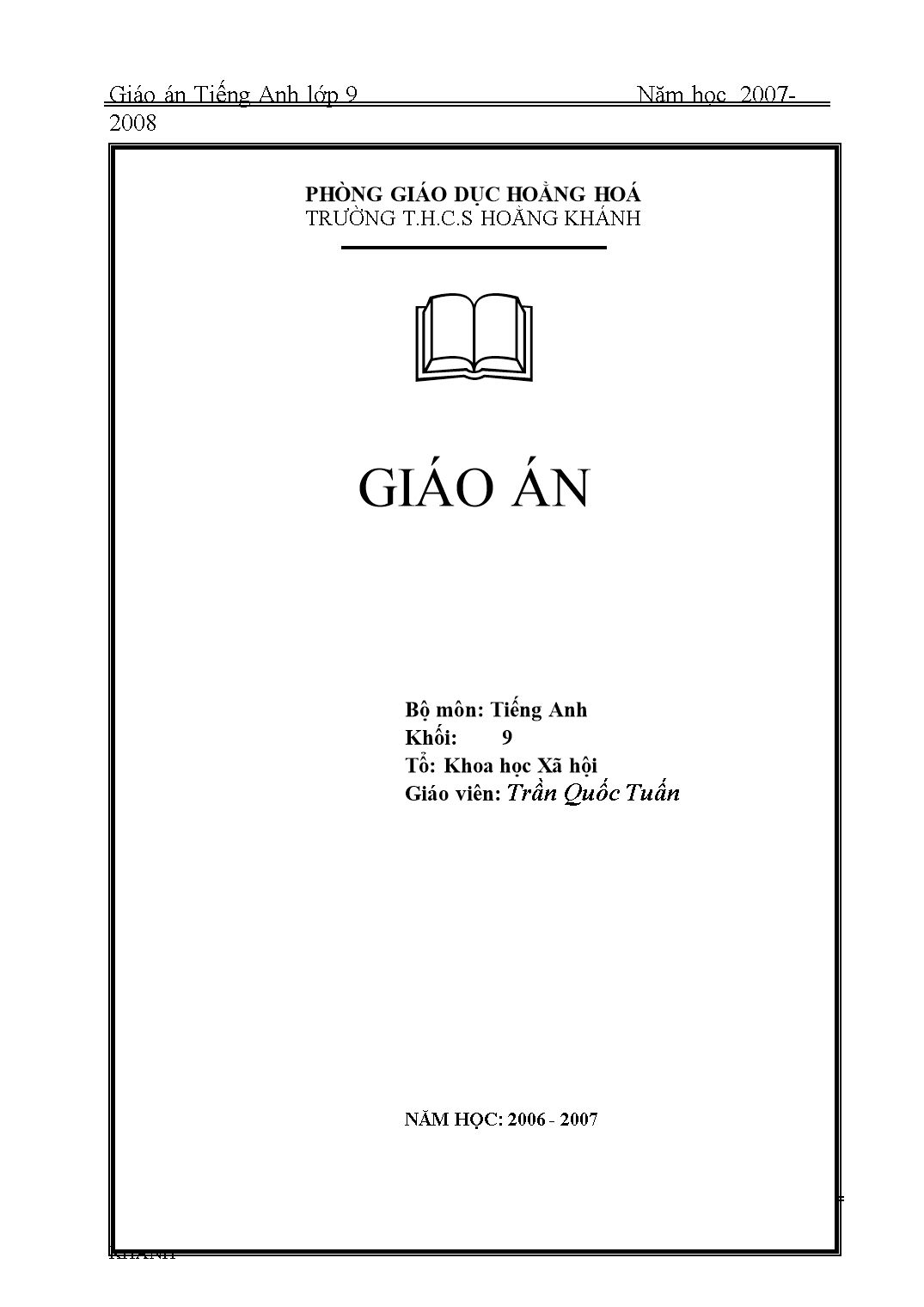
Trang 1
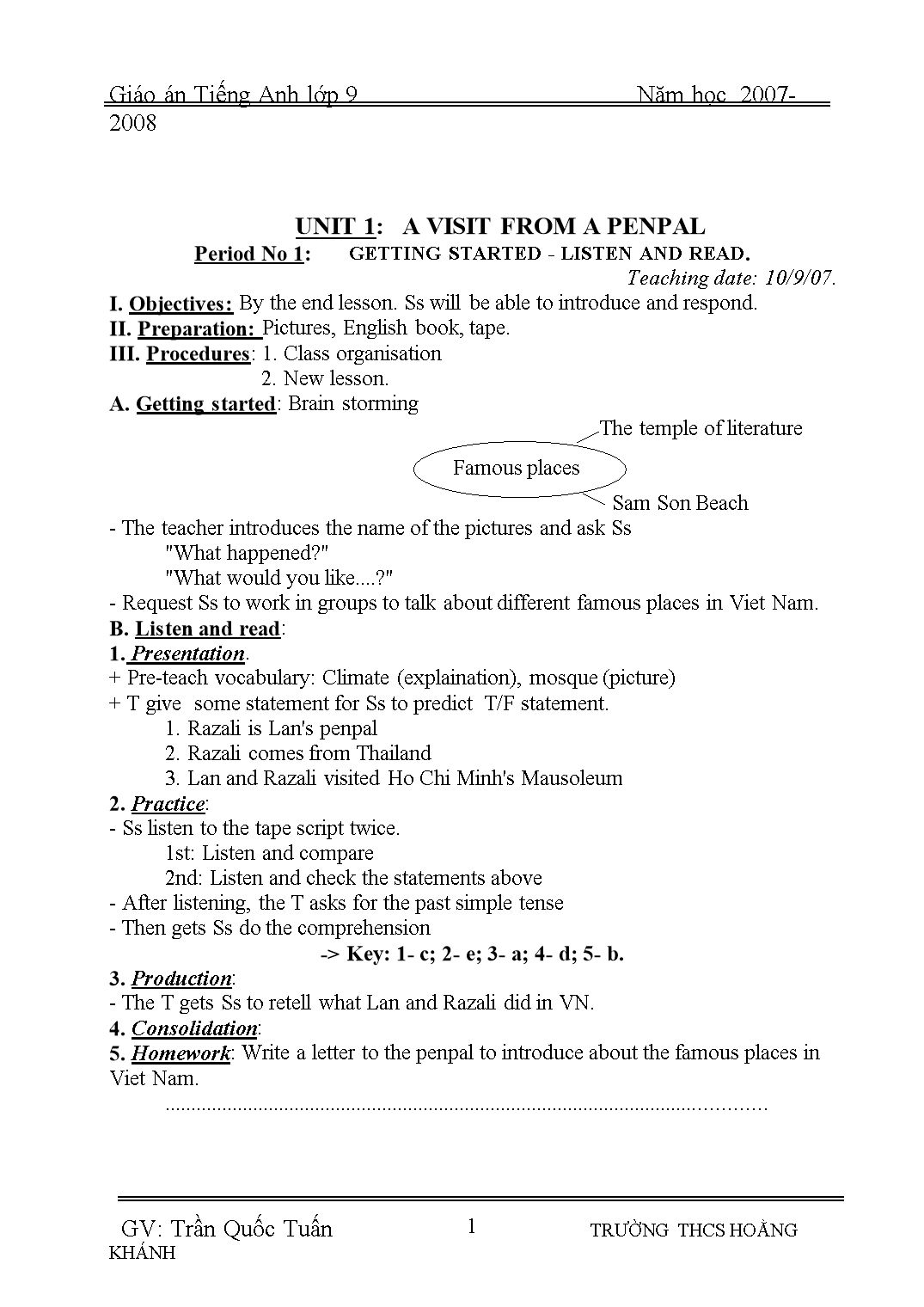
Trang 2
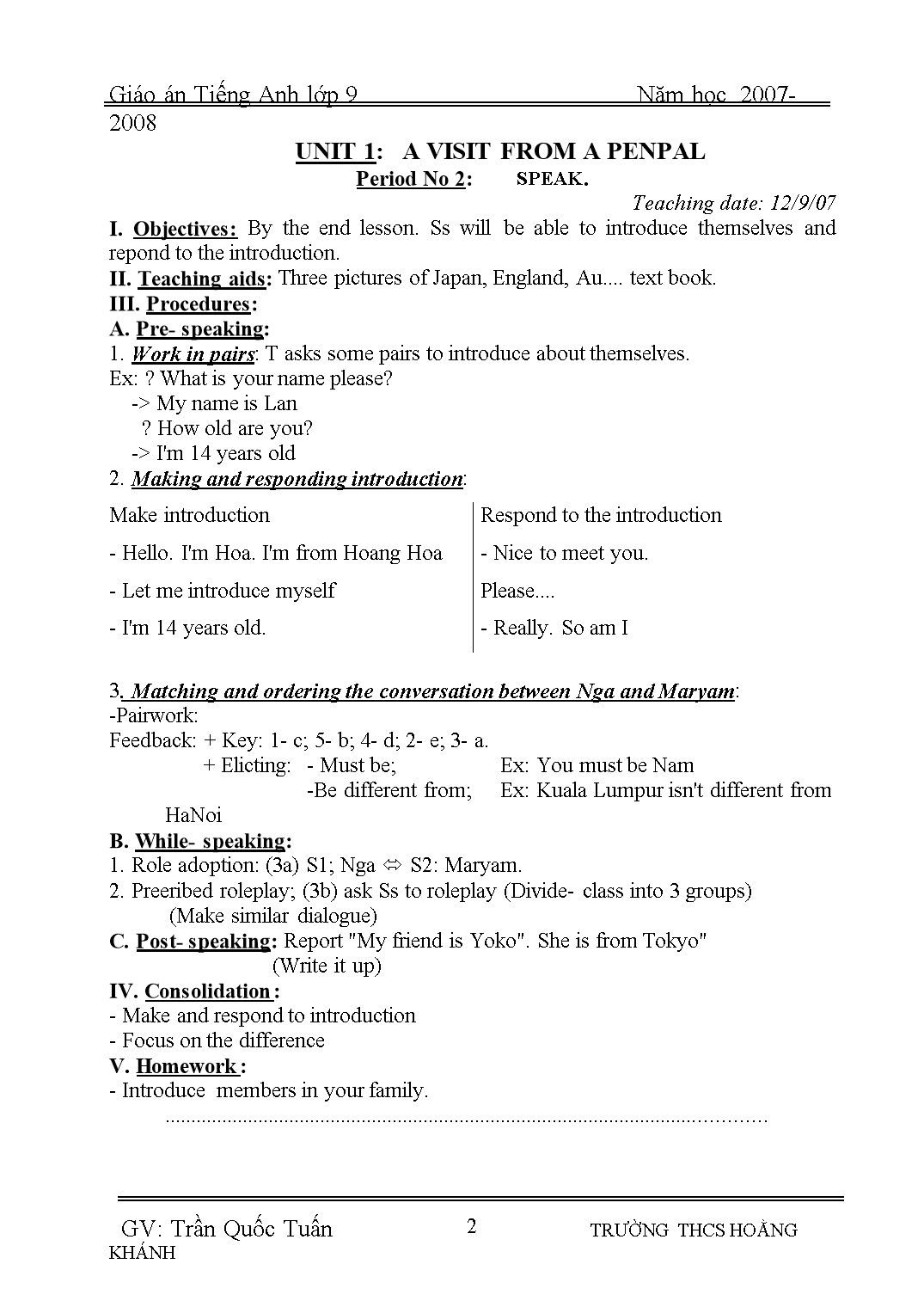
Trang 3
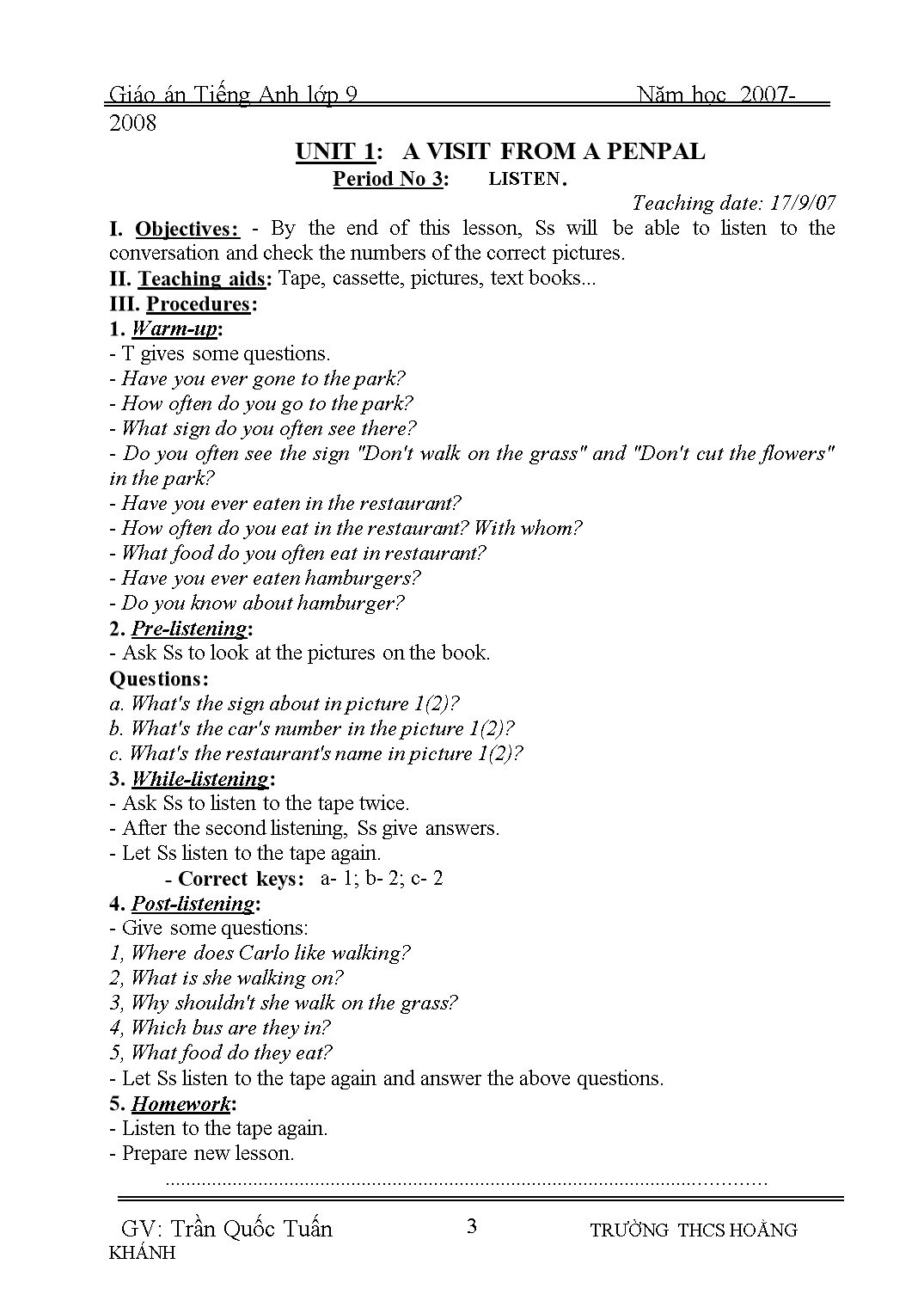
Trang 4
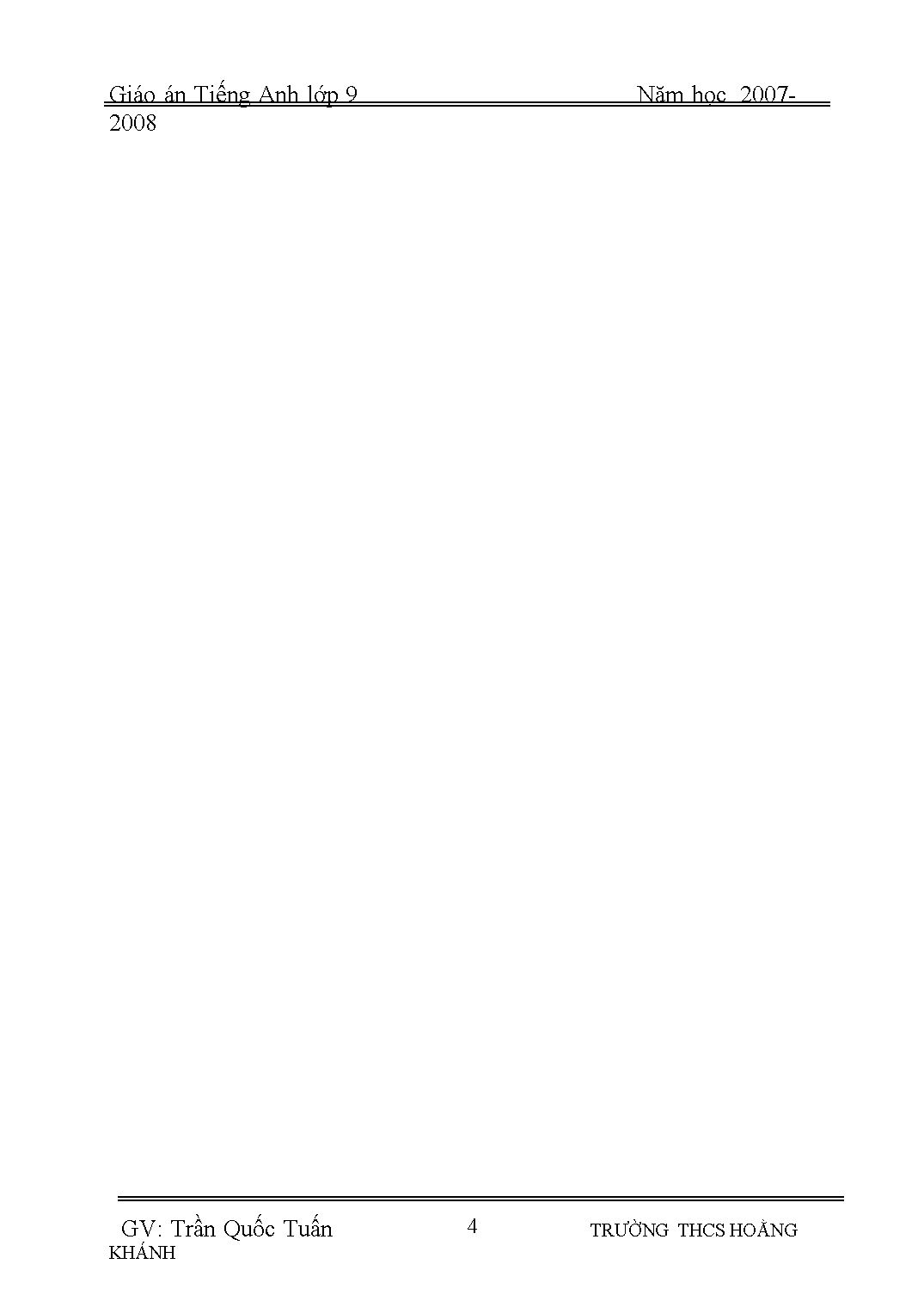
Trang 5
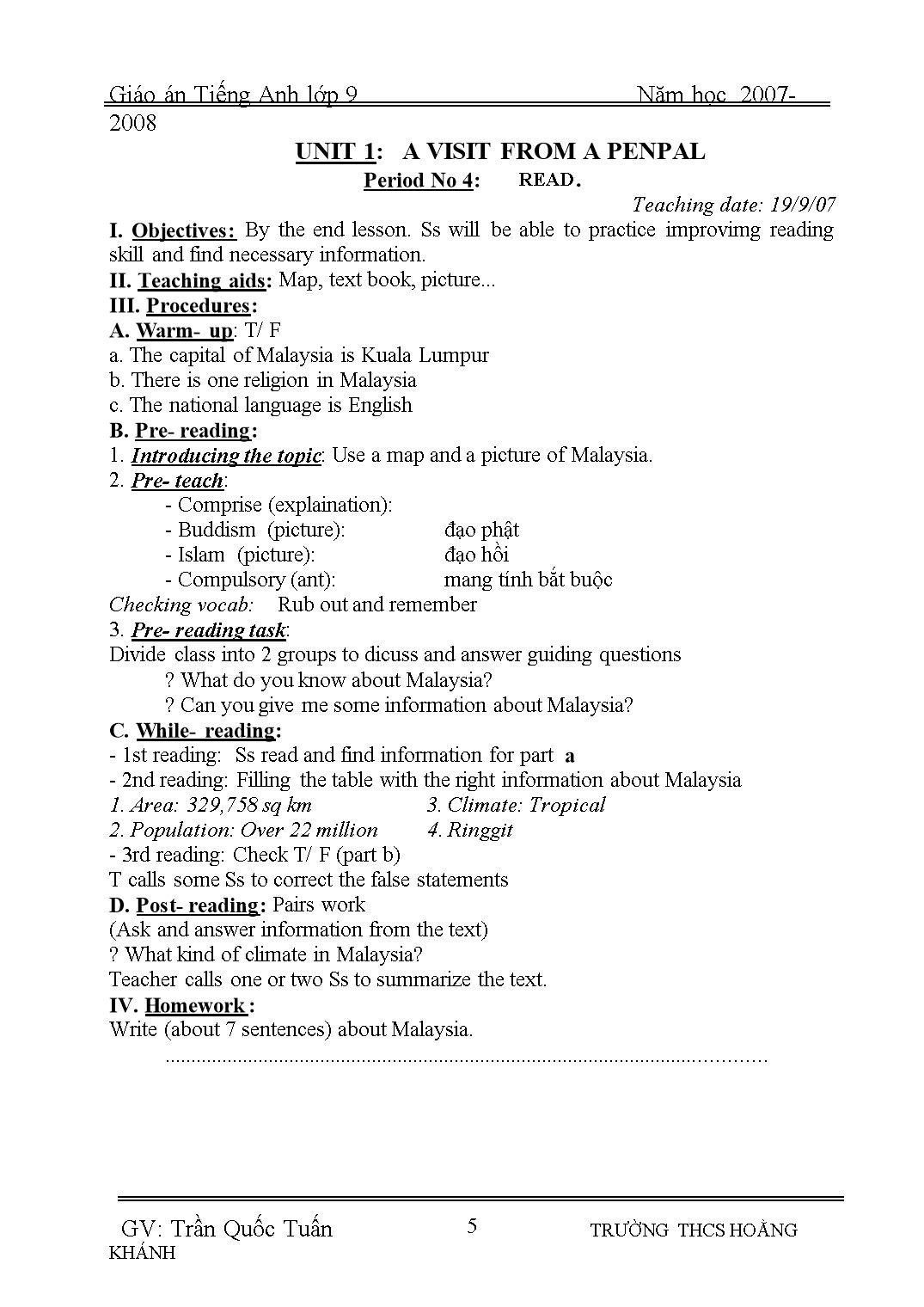
Trang 6
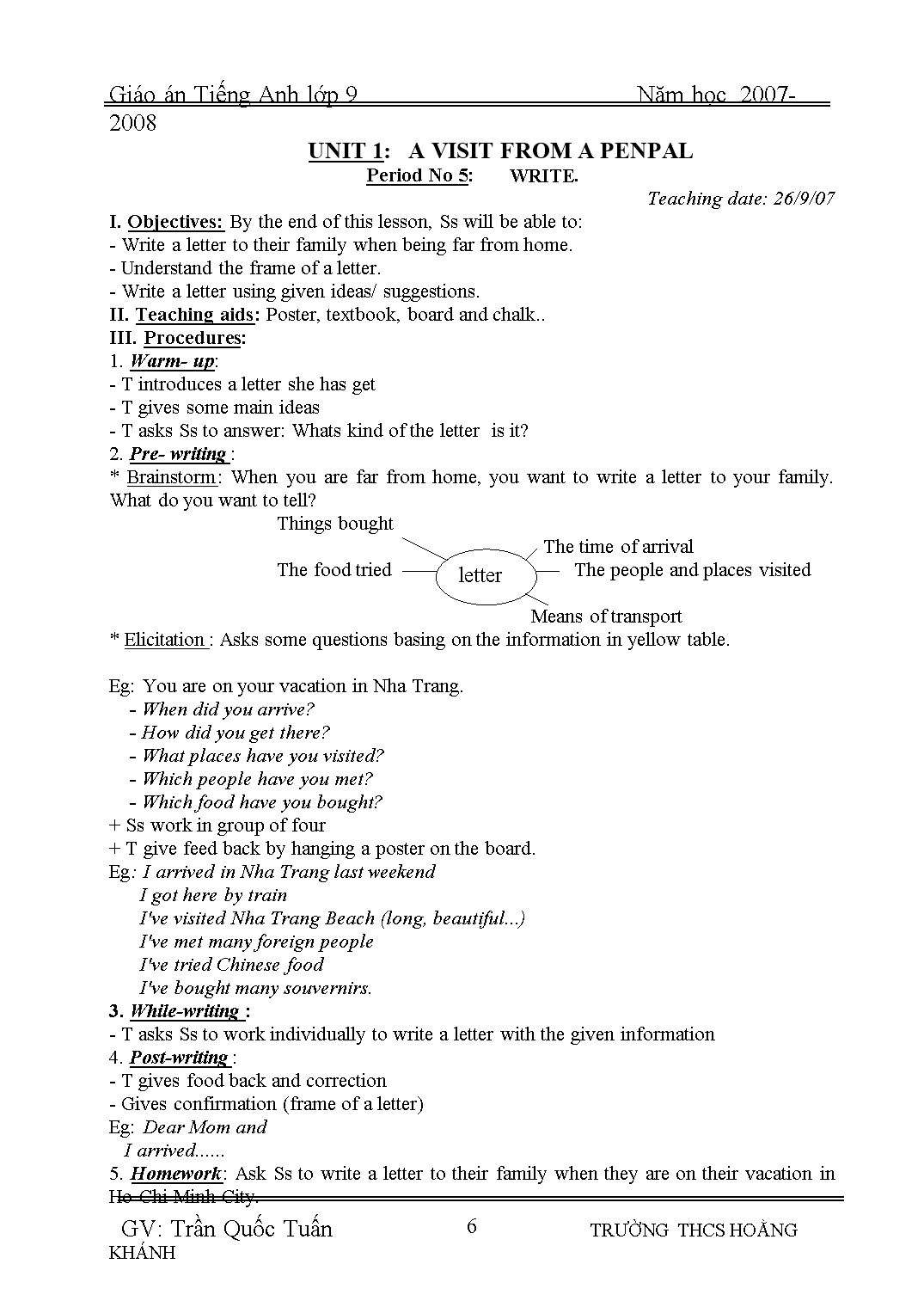
Trang 7
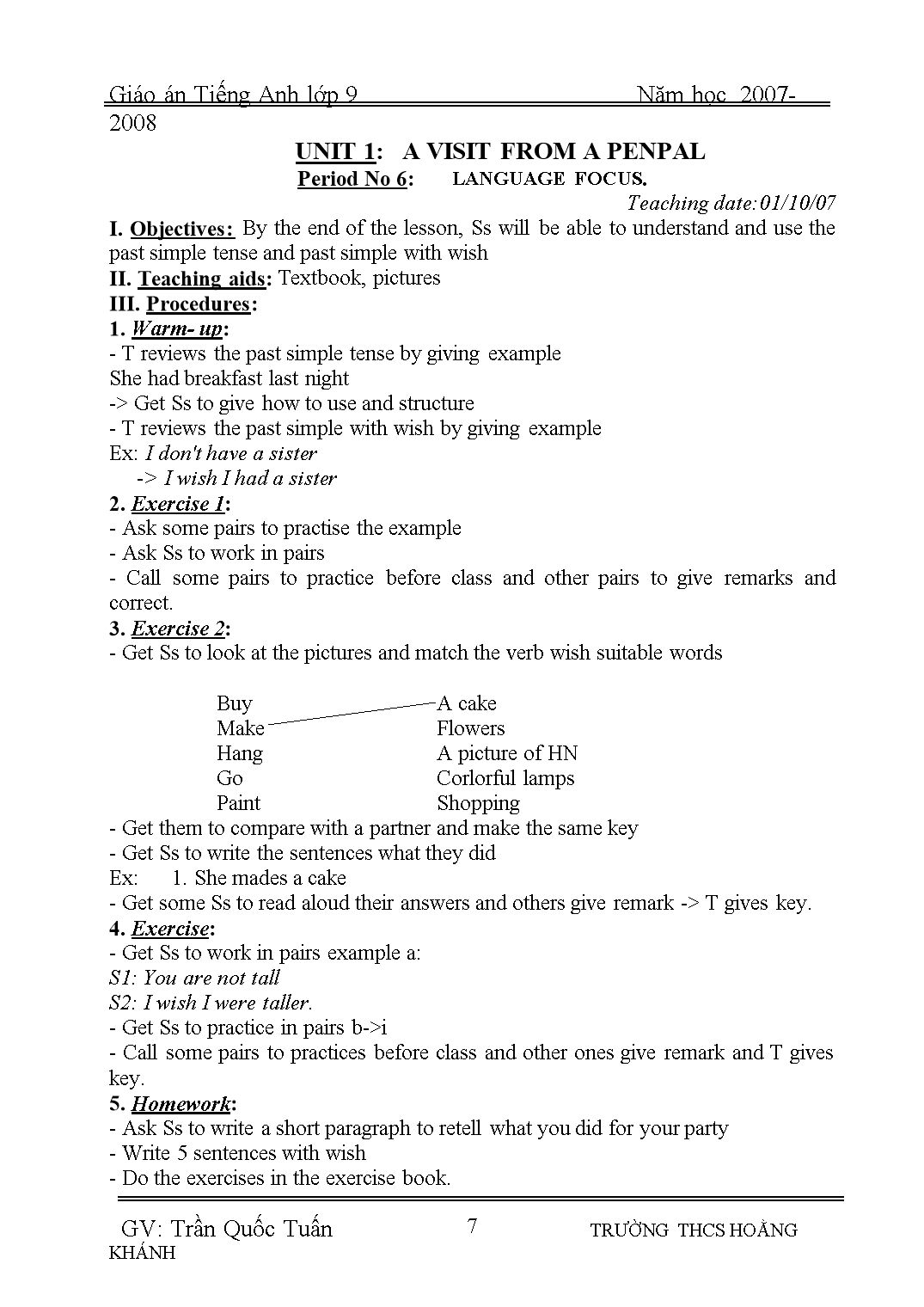
Trang 8
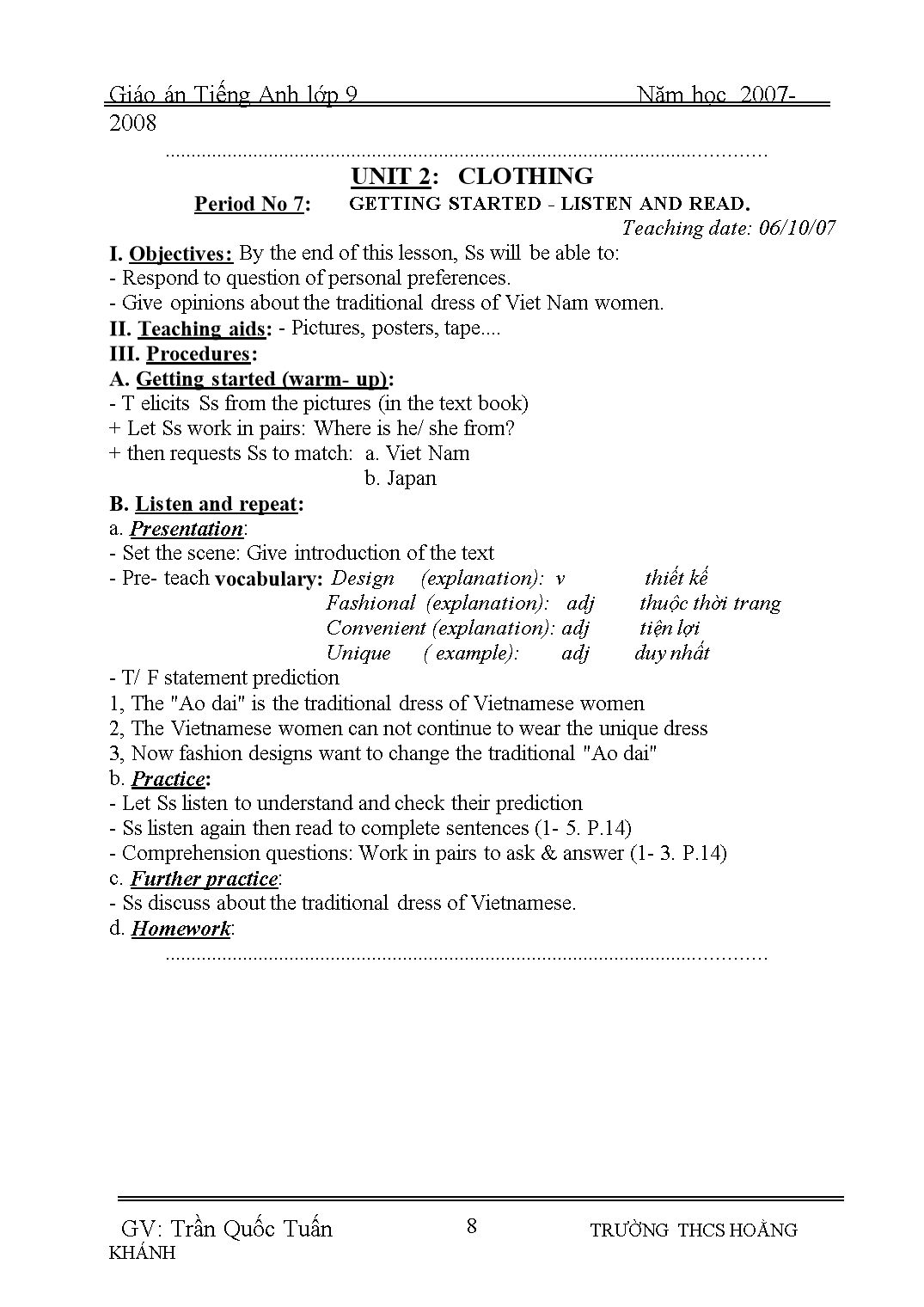
Trang 9
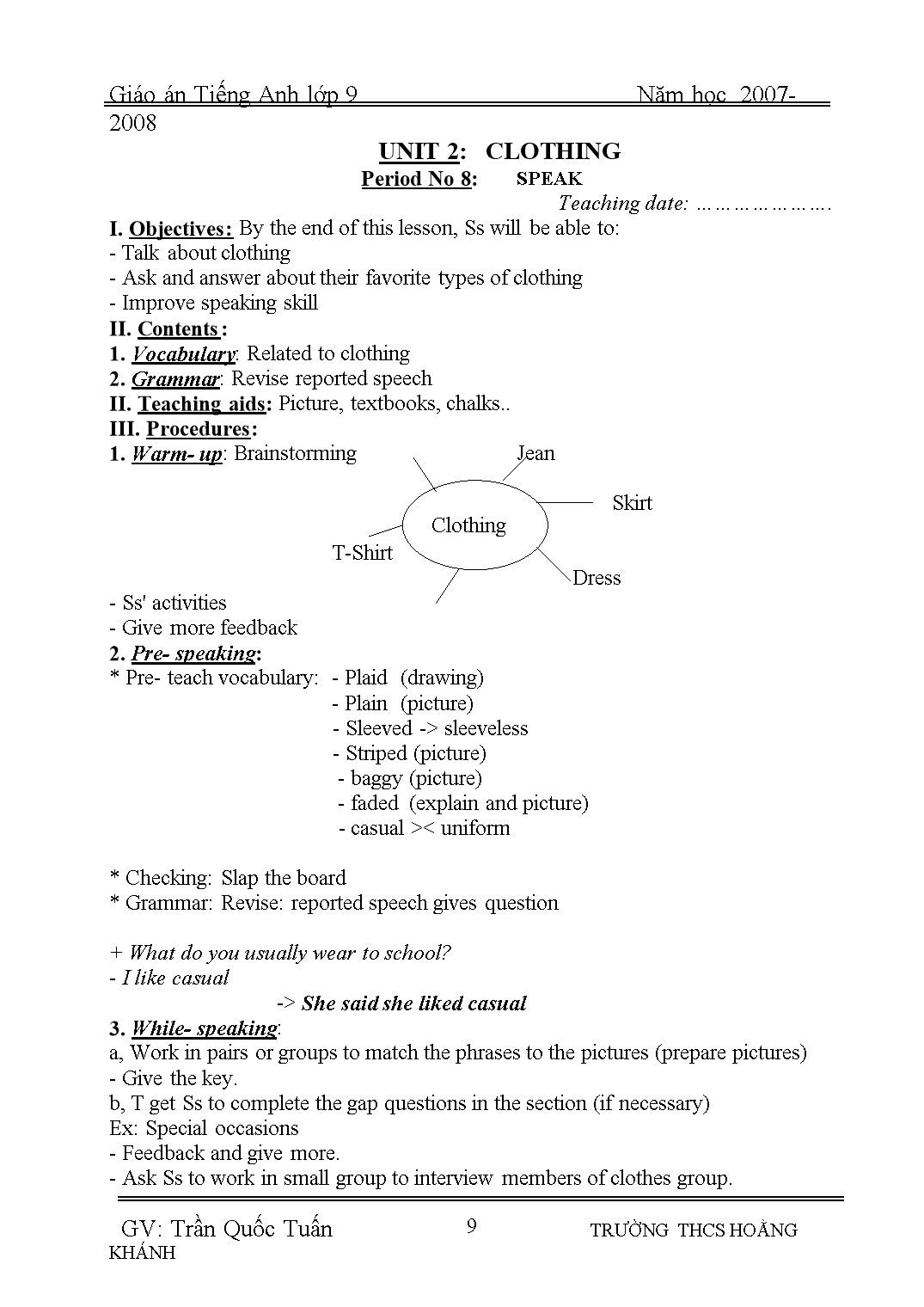
Trang 10
Tải về để xem bản đầy đủ
Bạn đang xem 10 trang mẫu của tài liệu "Giáo án Tiếng Anh Lớp 9 - Chương trình cả năm - Trần Quốc Tuấn", để tải tài liệu gốc về máy hãy click vào nút Download ở trên
Tóm tắt nội dung tài liệu: Giáo án Tiếng Anh Lớp 9 - Chương trình cả năm - Trần Quốc Tuấn
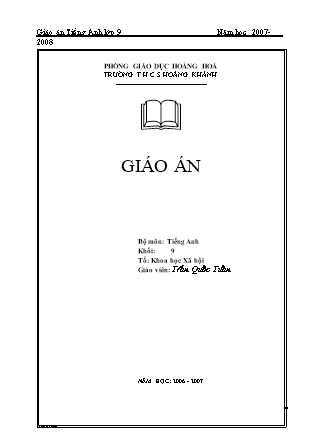
PHÒNG GIÁO DỤC HOẰNG HOÁ TRƯỜNG T.H.C.S HOẰNG KHÁNH & GIÁO ÁN Bộ môn: Tiếng Anh Khối: 9 Tổ: Khoa học Xã hội Giáo viên: Trần Quốc Tuấn NĂM HỌC: 2006 - 2007 UNIT 1: A VISIT FROM A PENPAL Period No 1: GETTING STARTED - LISTEN AND READ. Teaching date: 10/9/07. I. Objectives: By the end lesson. Ss will be able to introduce and respond. II. Preparation: Pictures, English book, tape. III. Procedures: 1. Class organisation 2. New lesson. A. Getting started: Brain storming The temple of literature Famous places Sam Son Beach - The teacher introduces the name of the pictures and ask Ss "What happened?" "What would you like....?" - Request Ss to work in groups to talk about different famous places in Viet Nam. B. Listen and read: 1. Presentation. + Pre-teach vocabulary: Climate (explaination), mosque (picture) + T give some statement for Ss to predict T/F statement. 1. Razali is Lan's penpal 2. Razali comes from Thailand 3. Lan and Razali visited Ho Chi Minh's Mausoleum 2. Practice: - Ss listen to the tape script twice. 1st: Listen and compare 2nd: Listen and check the statements above - After listening, the T asks for the past simple tense - Then gets Ss do the comprehension -> Key: 1- c; 2- e; 3- a; 4- d; 5- b. 3. Production: - The T gets Ss to retell what Lan and Razali did in VN. 4. Consolidation: 5. Homework: Write a letter to the penpal to introduce about the famous places in Viet Nam. ................................................................................................................... UNIT 1: A VISIT FROM A PENPAL Period No 2: SPEAK. Teaching date: 12/9/07 I. Objectives: By the end lesson. Ss will be able to introduce themselves and repond to the introduction. II. Teaching aids: Three pictures of Japan, England, Au.... text book. III. Procedures: A. Pre- speaking: 1. Work in pairs: T asks some pairs to introduce about themselves. Ex: ? What is your name please? -> My name is Lan ? How old are you? -> I'm 14 years old 2. Making and responding introduction: Make introduction - Hello. I'm Hoa. I'm from Hoang Hoa - Let me introduce myself - I'm 14 years old. Respond to the introduction - Nice to meet you. Please.... - Really. So am I 3. Matching and ordering the conversation between Nga and Maryam: -Pairwork: Feedback: + Key: 1- c; 5- b; 4- d; 2- e; 3- a. + Elicting: - Must be; Ex: You must be Nam -Be different from; Ex: Kuala Lumpur isn't different from HaNoi B. While- speaking: 1. Role adoption: (3a) S1; Nga ó S2: Maryam. 2. Preeribed roleplay; (3b) ask Ss to roleplay (Divide- class into 3 groups) (Make similar dialogue) C. Post- speaking: Report "My friend is Yoko". She is from Tokyo" (Write it up) IV. Consolidation: - Make and respond to introduction - Focus on the difference V. Homework: - Introduce members in your family. ................................................................................................................... UNIT 1: A VISIT FROM A PENPAL Period No 3: LISTEN. Teaching date: 17/9/07 I. Objectives: - By the end of this lesson, Ss will be able to listen to the conversation and check the numbers of the correct pictures. II. Teaching aids: Tape, cassette, pictures, text books... III. Procedures: 1. Warm-up: - T gives some questions. - Have you ever gone to the park? - How often do you go to the park? - What sign do you often see there? - Do you often see the sign "Don't walk on the grass" and "Don't cut the flowers" in the park? - Have you ever eaten in the restaurant? - How often do you eat in the restaurant? With whom? - What food do you often eat in restaurant? - Have you ever eaten hamburgers? - Do you know about hamburger? 2. Pre-listening: - Ask Ss to look at the pictures on the book. Questions: a. What's the sign about in picture 1(2)? b. What's the car's number in the picture 1(2)? c. What's the restaurant's name in picture 1(2)? 3. While-listening: - Ask Ss to listen to the tape twice. - After the second listening, Ss give answers. - Let Ss listen to the tape again. - Correct keys: a- 1; b- 2; c- 2 4. Post-listening: - Give some questions: 1, Where does Carlo like walking? 2, What is she walking on? 3, Why shouldn't she walk on the grass? 4, Which bus are they in? 5, What food do they eat? - Let Ss listen to the tape again and answer the above questions. 5. Homework: - Listen to the tape again. - Prepare new lesson. ................................................................................................................... UNIT 1: A VISIT FROM A PENPAL Period No 4: READ. Teaching date: 19/9/07 I. Objectives: By the end lesson. Ss will be able to practice improvimg reading skill and find necessary information. II. Teaching aids: Map, text book, picture... III. Procedures: A. Warm- up: T/ F a. The capital of Malaysia is Kuala Lumpur b. There is one religion in Malaysia c. The national language is English B. ... ... 2. It may rain on your way home, so take a raincoat with you. In case...................................................................................................................... 3. That man used to work with me when I lived in New York. That's....................................................................................................................... 4. The storm destroyed the town completely. The town.................................................................................................................. 5. Despite his age, Mr.Thanh runs five kilometers every morning. Even......................................................................................................................... IV. Fill in each blank with a correct relative pronoun (who, that, which, where or whose): (2.5 points) 1. Last week we went to Hue ..................... is the anceint capital of Viet nam. 2. The shoes .............................. I bought were made in Italy. 3. What's the name of the lady .............................. was wearing the gold dress. 4. Ha Long Bay ......................... consists of hundreds of beautiful island, is world's heritage. 5. This is the house .............................. he used to live. Period No 60:Test corection Preparing date:06/4/08 Teaching date: 12/04/08 The answer keys: I. 1. whose; 2. who; 3. despite; 4. on; 5. was washing - was making; 6. which. II. 1. eruption; 2. destruction; 3. carriage; 4. celebration. III. 1. In spite of his broken leg/ having a broken leg, he managed to get out of the car. 2. In case it rains on your way home,(you'd better/ should) take a raincoat with you 3. That's the man who used to work with me when I lived in New York. 4. The town was destoyed completely/ completely destroyed by the storm. 5. Even though he is old, Mr.Thanh runs five kilometers every morning. IV. 1. which; 2. which/ that; 3. who/ that; 4. which; 5. where. ...................................................................................................................... UNIT 10: LIFE ON OTHER PLANETS Period No 61 GETTING STARED - LISTEN AND READ. Preparing date:10/4/08 Teaching date: 16/4/08 I. Objectives - By the end of lesson, Ss will be able to know more about UFOs with basic information. Moreover they can learn some more new words. II. Language contents: - Model verbs: may, might - Conditional sentences: type 1 and type 2 III. Materials: - Pictures, posters, the tape, the stereo IV. Method: - Communicative. V. Procedure: 1. Warm- up: - Use pictures to the situations - Ask Ss to work in pairs to discuss the questions in book. - Teacher gather ideas and provide some facts about UFOs (Unidentified Flying Object) * Pre-teach Vocab: spacecraft (n), planet (n), aircraft, weather balloon, meteor, evidence, existence, sightings, aliens, claim, soil samples, capture, examine (v), plate-like (a), device (n), treetop * Check: Rub out and remember 3. Practice: - Let them listen to the tape twice - Ask them to read the text again - Ask Ss to work in pairs to find the words in the text having the following meanings - Compare with a partner. - Check and correct Key: 1. evidence 4. collecting 2. meteor 5. captured 3. aliens 6. disppeared - Then ask Ss to use posters like in book complete the notes - Compare with a partner - Check and correct Key: a. an aircraft, a weather balloon b. nine large round objects trevelling at about 2,800 meters an hour c. a UFO above their e. an egg-shaped object on one of his fields and also aliens collecting soil samples f. claimed they were captured by aliens and taken abroad a spacecraft g. and his plane disappeared after sighting a UFO h. that he saw a plate-like device at a treetop 30 meters away 3. Production: - Teacher read a further text about UFOs so Ss can understand clearly about them. - Ask them to match A with B A 1. 1947 2. 1952 3. 1954 4. 1964 5. 1971 6. 1978 B a. a woman b. a farmer c. Kenneth Arrnold d. A young pilot e. 9.500 UFO sightings f. two men 4. Homework: - Learn new words - Do exercises - Prepare new lesson ...................................................................................................................... UNIT 10: LIFE ON OTHER PLANETS Period No 62 SPEAK – LANGUAGE FOCUS 1 Preparing date:12/4/08 Teaching date: 19/4/08 I. Objectives - By the end of lesson, Ss will be able to improve their speaking by talking about Mars and other planets using may and might. Moreover, they can know more something about Mars and other planets. II. Materials: - Posters III. Method: - Communicative. IV. Procedure: 1. Pre- speaking: What's there on the Mars? Play brainstorming: micro organise planets trace animals lakes water rivers creatures minerals gemstones Pre-teach Vovab: - minerals -gemstone -little creatures -micro organise -spots -sparkling. - Introduce the situation like in section a in the text book - Ask them to read the dialogue - Take rotes: using S + may/ might + V + ......... to express our guessing 2. While- speaking: - Ask Ss to work in pairs. Make up the similar dialogues about drawings, using the cues in section a Ex: A: What do these drawings say? B: There might be mountains in Mars A: And what about these green ticks (Mars)? B: Well, they might be plants - Check and gives them some suggestions if they need: Ex: waryline, dark shapes, on the left corner.......... 3. Post- speaking: - Ask them to work in groups and discuss to talk about what they think might be on Mars, the moon and on other planets - Teacher can give them some more information about other planets - Check and correct - Ask some groups to present their ideas 4. Further practice: Further reading: "Solar system nine planets" so Ss can understand more about planets. 5. Homework: - Learn by heart new words - Do exercises - Practice at home - Prepare new lesson. ...................................................................................................................... UNIT 10: LIFE ON OTHER PLANETS Period No 65: LISTEN. Teaching date:..................... I. Objectives - By the end of lesson, Ss will be able to improve their listening skill by listening to the talk about the Moon. Moreover, they can know some more information about the Moon. II. Materials: - Text book, pictures, the tape, the stereo III. Method: - Communicative. IV. Procedure: 1. Pre-listening: Use pre-questions: What do you know about the Moon? Can people live on the Moon? Is therer any water? Is there any air? Are there any trees on it? Who was the first person to come to the Moon? When? Pre-teach Vocab: -Science for Fun program, -crater -Olympic Champion, -steps - Use predict technique: Ask Ss to guess then check (v) the correct statements about the Moon in book. - Compare with a partner 2. While-listening: - Let them listen to the tape twice - Ask them to check (v) - Compare with a partner - Check and correct - Let them listen again one more time to ensure. - Ask them to write the correct statements in book 3. Post-listening: - Use comprehension questions: What about temperatures at night on the Moon? during the day? What does the holes on the Moon look like? How many craters are there on the Moon? How high is the highest mountains on it? - Ask Ss to summarize the main ideas about the Moon Ex: There is no air on there Moon. There are no sounds on it. It is very cold at night, the temperature goes down to 1510C below zero. But during the day it is very hot, the temperature rises to 1000C above zero. There are great holes on the Moon. They look like big lakes. They are called craters, there are more than 30,000 craters on the Moon. There are high mountains. The high mountains are about 26,000 feet or 8,000 meters high. We are much lighter on the Moon, we can jump very high and take very long steps as well. One more interesting thing is that: one day on the Moon tasts for two weeks. - Teacher can give them by reading a further reading. 4. Homework: - Learn by heart new words - Do exercises - Practise speaking about the Moon at home - Prepare new lesson. ...................................................................................................................... UNIT 10: LIFE ON OTHER PLANETS Period No 66: READ. Teaching date:..................... I. Objectives - By the end of lesson, Ss will be able to enhance reading skill through ordering and abswering questions exercises. Moreover, they can get some information about a space trip. II. Materials: - Text book, pictures, posters III. Method: - Communicative. IV. Procedure: 1. Pre-reading: Use pre-questions: -Have you ever heard of space trip? -What do people go there for? -Do you want you to take a space trip? -What would you do to prepare for the trip? -What would you like to bring along? Pre-teach Vocab: + physical condition, + push-ups, + perfect (a), + orbit (v) + cabin, + on board, + marvelous (a) + dream (v) - Check: what and where 2. While-reading: - Introduce the text: now you will read a text which talk about what you should prepare to have a space ship and what you will see and feel - Let them read the text twice - Ask some Ss to read aloud the text - Check their mistake of pronounciation - Let them put the phrases in order - Compare with a partner - Check and correct Key: 4- 1- 5- 2- 3 - Then ask them to answer questions in book - Work in pairs - Compare and correct Key: 1. If you decide to take a space trip, you will have to run a lot, swim every day, and do aerobics, push-ups to have an excellent condition. 2. If you want to show you are in perfect health, you must get a letter from doctor. 3. You can see pictures of the Earth: your country, interesting places, the oceans, the big rivers, the tall mountains. 4. We can see those scenes 16 times a day 5. We can walk on the walls or on the ceiling 6. Answer yourself - Ask them to write the answers in book. 3. Post-reading: - Do a further exercise: * Supply the correct form tense of the verbs: a. What.............you (do)..............if you (have)..............a million dollars? b. If you(be)............able to take a space trip, what..........you (do)..........to prepare for the trip? c. He (go)............to the movie tonight, if he (have)...........free time. d. He wishes he (be)...........rich and he (can)...........buy a car. e. If I (be).............you, I (let)............him know. f. If today (be)............sunday, I (visit)...........you. 4. Homework: - Learn by heart new words - Do exercises - Prepare new lesson - Learn Grammar ...................................................................................................................... UNIT 10: LIFE ON OTHER PLANETS Period No 67: WRITE. Teaching date:..................... I. Objectives - By the end of lesson, Ss will be able to know how to write an argumentative exposition using the right format and language structures. Moreover, they can give their own ideas about the existing of UFOs. II. Materials: - Text book, posters III. Method: - Communicative..... IV. Procedure: 1. Pre-writing: Introduce the situations - You have learned how to write an argument in Unit 2. Who can tell me how many parts there are in an argument, what are they? - There are 3 parts. - They're: Introduction, Body and conclusion - What's there in each part? Now you have to match A with B (in text book) in correct. - Compare with a partner - Check and correct + Introducion: II + Body: III + Conclusion: I So today you can will write an exposition, it is like an argument, or we can call an argumentative exposition. - Ask them: When do we write an exposition? We write it when we want to present one's ideas, opinions and make them persuasive to reader. - Then ask Ss to read the dialogue about the existence of UFOs. - Work in pairs - Use some comprehension questions + Does Ba think UFOs exist? + What makes he believes there are OFOs? 2. While-writing: - Let them use Ba's opinions in the dialogue to write an exposition about the existence of UFOs. - Ask some Ss to read aloud their essay. a key: I believe UFOs exist because articles ans reports in newspapera talked a lot about their appearance. Fisrtly, many people from different countries. Secondly, there are many photos of flying saucers and some photographers said they saw man-like creatures get out of whiles. Moreover, people are discussing those mysterions circles on the fields in the countryside of Great Britain. Therefore, I think UFOs are not ready to see their visits. 3. Post-writing: - Ask them to write an exposition in book - Summary the format of writing an exposition + Introduction: -I think....... -I believe.......... -In my opinion,........... + Body: -Firstly -Secondly + Conclusion: -To sum up -Therefore -So...... 4. Homework: - Do exercises - Prepare new lesson - Complete your essay. ............................................................................................................... UNIT 10: LIFE ON OTHER PLANETS Period No 68: LANGUAGE FOCUS. Teaching date:..................... I. Objectives - By the end of lesson, Ss will be able to considate what they learned by doing some exercises and some further exercises. II. Language contents: Modals: may, might Conditional sentences: type 1 and type 2. III. Materials: - Text book, posters IV. Method: - Communicative..... V. Procedure: 1. Warm-up: Pre-teach Grammar: a. Modal verbs: May, might + V............ to talk about our guessing about something. Ex: It might be a book. It may rain tomorrow. b. Conditional sentences: * Type 1: Form: If clause, main clause (present simple) (future simple) Usage: It can be used to deserible situations or consequences that are possible in the present or future. Ex: I will visit you if I am free tomorrow He will joines us if he completes his exercises * Type 2: From: If clause, main clause (past simple) (future in the past) Usage: It can be used to discribe imaginary and unreal or untrue situations/ actions at present or in the future. -If I were a millionair, I would give you some money. -If I studied harder, I would get a gift from my parents - Then ask Ss to make examples. 2. Practice: - Ask Ss to work in pairs to do all exercises in book. 3. Further practice: - Check and correct. - Ask them to write the answers in book. - Given them some more exercises to do. - Ask them to review all lessons. 4. Homework: - Do exercises. - Review all lessons: Grammar and exercises. ...................................................................................................................... Period No 69+70: ÔN TẬP VÀ KIỂM TRA HỌC KỲ II. Teaching date:.....................
File đính kèm:
 giao_an_tieng_anh_lop_9_chuong_trinh_ca_nam_tran_quoc_tuan.doc
giao_an_tieng_anh_lop_9_chuong_trinh_ca_nam_tran_quoc_tuan.doc

